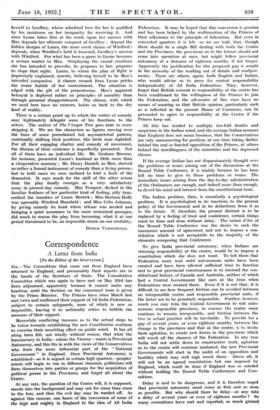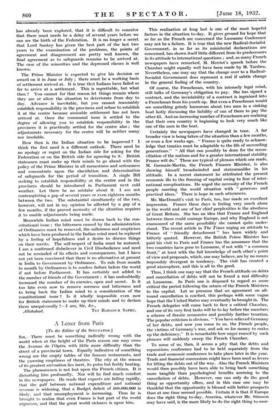Correspondence
A Letter from India
[To the Editor of the SPECTATOR.] SIR,—Tire Committees that came out from England have returned to England, and presumably their reports are in the hands of the Secretary of State. The Consultative Committee which was again to have met on May 23rd has been adjourned, apparently because it cannot make any headway until the decision on the communal issue is given by the Prime Minister. The Princes have since March last met twice and reaffirmed their support of All India Federation, subject to certain safeguards, none of which is new or impossible, leaving it to unfriendly critics to belittle the measure of their support.
Meanwhile conflicting rumours as to the actual steps to be taken towards establishing the new Constitution continue to exercise their unsettling effect on public mind. It has all along been felt, not wholly without reason, that what the bureaucracy in India—minus the Viceroy—wants is Provincial Autonomy, and this fits in with the views of the Conservatives who form the more influential part of the " National Government " in England. Once Provincial Autonomy is established—so it is argued in certain high quarters—peoples' minds will begin to run in different channels, politicians will form themselves into parties or groups for the acquisition of political power in the Provinces, and forget all about the Centre.
At any rate, the question of the Centre will, it is supposed, recede into the background and may not for some time come to the fore, and thus the evil day may be warded off. As against this rumour, one hears of the conversion of some of the high and mighty in England to the idea of All India Federation. It may be hoped that this conversion is genuine and has been helped by the reaffirmation of the Princes of their adherence to the principle of federation. But even in converted quarters it is felt—so we are told, that, though there should be a single Bill dealing with both the Centre and the Provinces, the provisions as to the former should not come into operation at once, but might follow provincial autonomy at a distance of eighteen months, if not longer. Apparently the justification for this proposed gap is sought in the necessity of the working out of details and readjust- ments. There are others, again, both English and Indian, who would advise us to press for central responsibility independently of All India Federation. They, however, forget that British consent to responsibility at the centre has been conditioned by the willingness of the Princes to join the Federation, and the advocates of this view have no means of assuring us that British opinion, particularly such as is reflected in the present House of Commons, can be persuaded to agree to responsibility at the Centre if the Princes keep out.
All this has tended to multiply ten-fold doubts and suspicions in the Indian mind, and the average Indian assumes that England does not mean business, that the Conservatives are only manoeuvring for position, at one time taking shelter behind the real or fancied opposition of the Princes, at others behind the unwillingness of the minorities and the depressed classes.
If the average Indian has not dispassionately thought over the problems or issues arising out of the discussions at the Round Table Conference, it is mainly because lie has been left no time to give to those problems or issues. The immediate issues arising from the day-to-day administration of the Ordinances are enough, and indeed more than enough, to divert his mind and interest from the constitutional issue.
The Indian problem, then, is essentially a psychological problem. It is psychological in its reactions to the present policy of the Government and in its deductions from it as to the future. If, therefore, the present distrust is to be replaced by a feeling of trust and confidence, certain things must be done and done without delay. The raison d'itre of the Round Table Conference was the desire to seek the maximum amount of agreement and not to impose a con- stitution which is not acceptable to the majority of the elements composing that Conference.
To give India provincial autonomy, when Indians are stressing responsibility at the centre, would be to impose a constitution which she does not want. To tell them that Federation must wait until autonomous units have been created and have been allowed sufficient time to function and to grow provincial consciousness is to misread the con- stitutional history of Canada and Australia, neither of which had a Central Government like ours at the time when Federations were created there. Even if it is not that, it is difficult to see how frequent friction can be avoided between an irresponsible centre and responsible provincial units, if the latter are to be genuinely responsible. Further, however much you may trim the Central Government to suit auto- nomous responsible provinces, in essence the centre must continue to remain irresponsible, and friction between the two in actual practice will be inevitable. To provide for a gap of several years, or even eighteen months, between the change in the provinces and that at the centre, is to invite fresh agitation, to create new forces in the provinces which will wreck all the chances of the Federation. In any case India will not settle down to constructive work, agitation as to the centre will continue unabated, the new Provincial Governments will start in the midst of an opposition and hostility which may well nigh wreck them. Above all, it will not be an agreed constitution but one imposed by England, which could be done if England was so minded without holding the Round Table Conferences and Com- mittees.
Delay is said to be dangerous, and it is therefore urged that provincial autonomy must come in first and as soon as possible. But why should there be delay—at any rate a delay of several years or even of eighteen months ? So many committees have met and reported, so much ground
has already been explored, that it is difficult to conceive that there must needs be a delay of several years before we can see the birth of the Federation. It is no longer a secret that Lord Sankey has given the best part of the last two years to the examination of the problems, the points of agreement and disagreement are pretty well known, the final agreement as to safeguards remains to be arrived at. The case of the minorities and the depressed classes is well known.
The Prime Minister is expected to give his decision or award on it in June or July ; there must be a working basis of settlement arrived at. It is true that Indians have failed so far to arrive at a settlement. This is regrettable, but what then ? You cannot for that reason let things remain where they are or allow the situation to deteriorate from day to day. Advance is inevitable, but you cannot reasonably establish responsibility in the provinces and refuse to establish it at the centre because amicable settlement has not been arrived at. Once the communal issue is settled to the degree of allowing you to establish responsibility in the provinces it is practically settled for the centre also ; the adjustments necessary for the centre will be neither many nor insoluble.
How then is the Indian situation to be improved ? I think the first need is a different outlook. There need be no apology or regret on the Indian side for asking for the Federation or on the British side for agreeing to it. British statesmen must make up their minds to go ahead with the policy of the Prime Minister in all earnestness and seriousness and concentrate upon the elucidation and determination of safeguards for the. period of transition. A single Bill seeking to establish responsibility at the centre and in the provinces should be introduced in Parliament next cold weather. Let there be no mistake about it. I am not contemplating a gap of several years or even eighteen months between the two. The substantial simultaneity of the two, however, will not in my opinion be affected by a gap of a few months, if the proved necessity of the situation requires it to enable adjustments being made.
Meanwhile Indian mind must be drawn back to the con- stitutional issue ; the bitterness caused by the administration of Ordinances must be removed, the sullenness and scepticism which have been produced in the Indian mind must be replaced by a feeling of hopefulness and a desire to discuss things on their merits. The self-respect of India must be restored. I am a confirmed disbeliever in Civil Disobedience and need not be reminded of its effects and consequences, but I have not yet been convinced that there is no alternative at present in India to Government by Ordinance. To rule from month to month by Ordinances is to confess failure before the world if not before Parliament. It has certainly not added to the number of friends of the Government ; it has undoubtedly increased the number of its enemies, open and secret. Is it too late even now to remove soreness and bitterness and to bring back the Indian mind to a consideration of the constitutional issue ? Is it wholly impossible even now for British statesmen to make up their minds and to declare them unequivocally ?—I am, Sir, &c.,









































 Previous page
Previous page